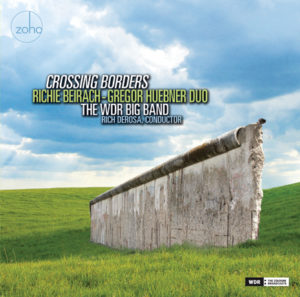Lemon Wire: Beirach and Gregor Huebner Duo join WDR Big Band on “Crossing Borders”
By Dodie Miller-Gould for Lime Wire
On “Crossing Borders,” the duo of Richie Beirach and Gregor Huebner, along with the WDR Big Band of Cologne, Germany, presents a collection of songs that symbolize a unique concept that blends styles in unexpected ways.
Beirach plays piano, Huebner plays violin and Rich DeRosa conducts on the recording. “Crossing Borders” offers listeners a mix of jazz and classical, and edgy and traditional sounds.
One way to get the most out of this recording is to dispense with expectations about music that involves big bands. The more experimental sounds are intriguing, but the traditional big band elements guarantee a mix of dynamics. In short, the music is artful without being inaccessible.
Both Beirach and Huebner composed music for the recording. Some of the most poignant tracks are Beirach’s compositions from the late 1970s. “Elm,” for example, was written after he had learned of Polish violinist, Zbiginew “Zbiggy” Seifert’s passing. It was written in 1979.
The organization of the recording will remind listeners of classical music. The titles help to remind audiences of the album’s concept. Songs like “Born in Brooklyn,” and “Kathmandu” offer a sense of place, while “Elm,” “The Grave” and “Into the Quest” perhaps suggest the things that inspire expression.
The recording begins with “Rectilinear/Paradox.” The song is actually a medley comprised of two songs written by Beirach.
A blare of horns that seem to play an almost call and response dialogue, sets up a sense of expectations that is quickly set aside. It is a short song, but offers the best of both songs in the course of its playing. The swaying blare of horns is almost all classic jazz, but the sometimes uneasy clatter of horns makes it sound as if the solid planet of sound is likely to slide off its axis. Of course, recovery is made at the last minute. The climax of the song is high-energy and full of sound. Listening to this song gets audiences prepared for what is to come, and it engages listeners with its not-quite expected rhythms and dynamics.
“Kathmandu” is actually the first movement of “Violin Concerto No. 3.” Brooding, deep-registered strings play a dirge-like motif while a sinewy violin pierces the listener with its poignant sound, made more so by its contrast with the darker string sound.
Gradually, the sounds begin to lighten. They are still playing their parts, but a change is happening. The violin seems to have gone on a quest and fades out after offering up a series of uneasy notes. When the ensemble comes back in, a full, jazz sound takes over. Think the dance hall scene in “West Side Story.” After that segment, the violin plays with the force and quality of that which some would call a fiddle.
The song is representative of the earthquake that struck Nepal in April 2015 – – coinciding with when Huebner had just conceived of the project. The devastating event and the subsequent grief that overwhelmed those who knew of it, all seem to be captured in this song.
The works on “Crossing Borders” show that geographic boundaries do not keep people from experiencing emotions about events that occurred even thousands of miles away from where they are. Huebner and Beirach and the WDR Big Band keep traditions alive and push boundaries between jazz and classical music to symbolize the human experience.


